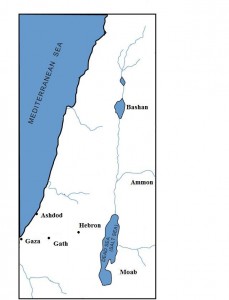
Both Christians and unbelievers are guilty of misusing Bible verses by ripping them from their original context.
We have probably all done it before. I know I have. In fact, I have even made the mistake of doing it in a published work. I used a Bible verse improperly by not paying close enough attention to its context.
This is a common problem among both Christians and non-Christians. Many skeptics and other unbelievers will pull verses out of context in their efforts to attack the Bible. Many Christians have heard or read a verse that they really like, so they quote it as though it was given as a divine promise just for them. However, we must be careful to examine the context of a passage and make sure that when we quote a verse, we use it in a way that the original author meant for it to be used.
In this particular post, I want to examine one of the verses that Christians regularly misuse. In some future posts, we will look at some more verses misused by Christians and some misused by unbelievers. I realize this will upset some of my readers, but before getting upset with me, you need to take some time and study the context of the verse and then ask yourself, “Am I using this verse appropriately, or am I guilty of misusing it?” I’ll close by sharing the verse that I misused at the end of one of my books.
Commonly Misused Verse #1: 2 Chronicles 7:14
If my people who are called by My name will humble themselves, and pray and seek My face, and turn from their wicked ways, then I will hear from heaven, and will forgive their sin and heal their land. (NKJV)
Well-intentioned Christians (especially in the U.S.) love to cite this verse as a promise from God that if believers in this nation would humble themselves and pray then God will fix our nation. Before you get upset with me for implying that this is not what this verse is about, ask yourself, “What is the context of this verse?” Do you know when these words were spoken and to whom they were addressed? Do you know the occasion for these words or have you just repeated them thinking that they were meant for your particular situation?
Let’s take a quick look at the context. The construction of the first temple in Jerusalem had just been completed. King Solomon led a massive week-long celebration to dedicate the temple. When the people returned to their homes following the celebration, we read this:
Then the LORD appeared to Solomon by night, and said to him: “I have heard your prayer, and have chosen this place for Myself as a house of sacrifice. When I shut up heaven and there is no rain, or command the locusts to devour the land, or send pestilence among My people, if My people who are called by My name will humble themselves, and pray and seek My face, and turn from their wicked ways, then I will hear from heaven, and will forgive their sin and heal their land. Now My eyes will be open and My ears attentive to prayer made in this place. For now I have chosen and sanctified this house, that My name may be there forever; and My eyes and My heart will be there perpetually. (2 Chronicles 7:12–16, NKJV)
These words were spoken to Solomon, the king of Israel, and God promised Solomon that when the land suffered from drought or pestilence, that if the people would humble themselves and pray, then God would hear those prayers and heal their land. The Lord specifically said that His eyes and ears would be attentive to the “prayer made in this place,” a reference to the temple in Jerusalem. As you continue reading the remaining verses in 2 Chronicles 7, it becomes extremely clear that this was a specific promise made by God to the Jewish people at the time of the first temple.
This is quite a bit different than Christians using this verse as a promise from God to fix the problems in the United States of America (or any other nation). Before you get too upset with me, let me point out that I think there are certainly principles we can draw from this. It is always a good thing for God’s people to humble themselves and pray for their nation. As Christians, we absolutely should pray for our nation. We should pray for our neighbors, friends, loved ones, and even our politicians–even the ones we don’t agree with (see 1 Timothy 2:1–4). I think it would be wonderful if every Christian would humble himself or herself and pray for our nation. It can’t hurt, and I think we would see God do some amazing things. However, 2 Chronicles 7:14 is not a divine promise to Christians in the United States that God will fix our nation. We don’t have such a guarantee in Scripture.
My Mistake
So which verse did I misuse? Near the end of my book, God and Cancer: Finding Hope in the Midst of Life’s Trials, I discussed how wonderful heaven is going to be. So I cited a verse I have heard used in this context several times. 1 Corinthians 2:9 states, “Eye has not seen, nor ear heard, nor have entered into the heart of man the things which God has prepared for those who love Him.” Doesn’t that sound like a wonderful description of heaven? It sure does, except for the fact that Paul was not talking about heaven.
A few months after the book came out I was studying that passage again and noticed, to my embarrassment, that it wasn’t about heaven at all. How do I know? Look at the very next verse: “But God has revealed them to us through His Spirit. For the Spirit searches all things, yes, the deep things of God” (1 Corinthians 2:10). Verse 9 was a quote from the Old Testament book of Isaiah. Paul told his readers that although God had not revealed in the Old Testament some of the wonderful things He had in store for His people, He has now revealed them to us by the Holy Spirit.
I’m looking forward to this being fixed in the next printing of the book. I still believe heaven will be far better than we can possibly imagine, but I would not use 1 Corinthians 2:9 in support of that belief. 2 Corinthians 12:2–4 and Revelation 21–22 would be better passages to convey that idea.
Thanks for reading. If you’ve enjoyed this post, please consider sharing it with your friends on facebook and/or twitter by clicking the appropriate button(s) below.

